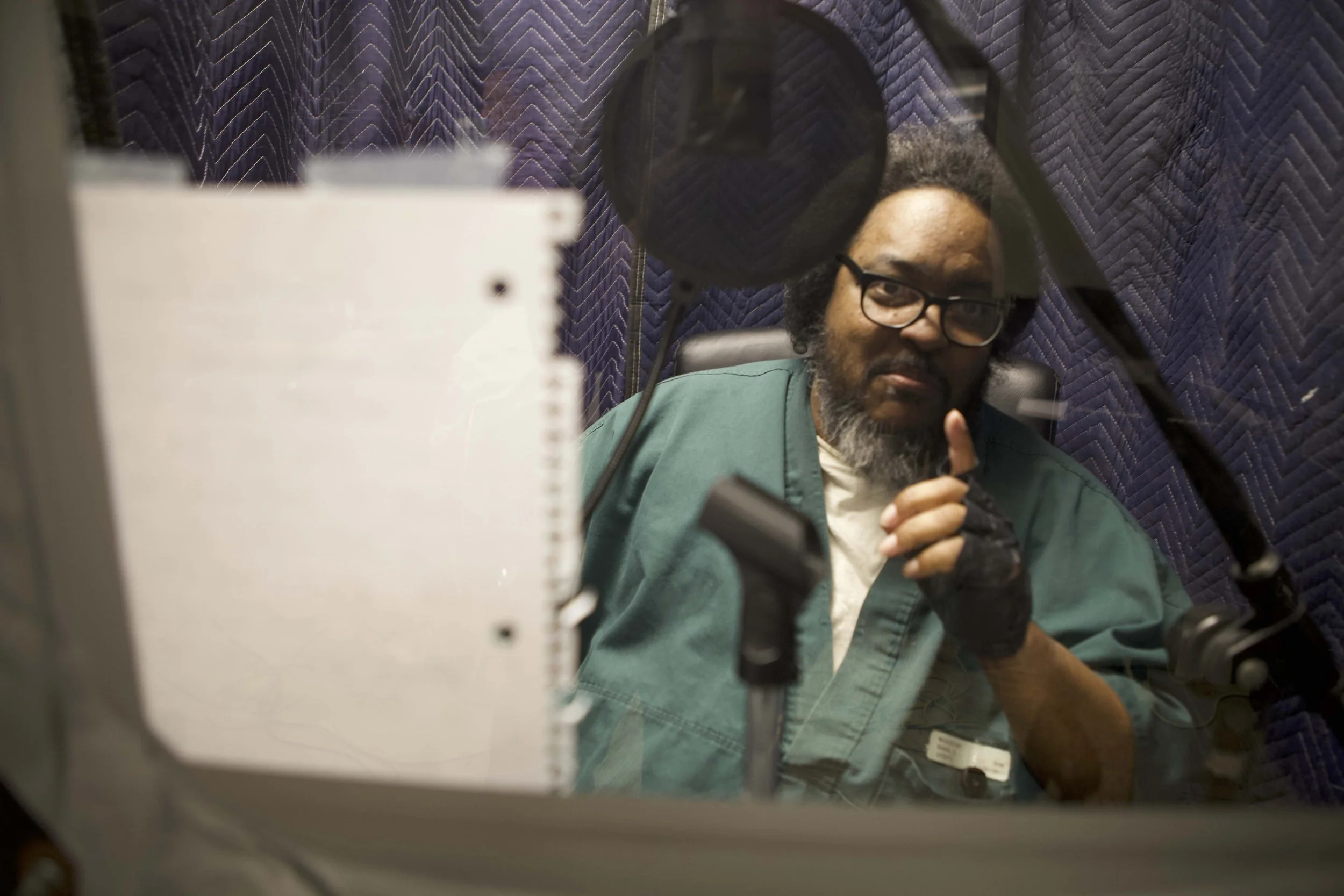A Tribute to Kevin Woodley
Written by Fury Young
Published 9/19/24
Remembering a musical giant.
Last week I received the news that Kevin Woodley, a musician and singer who I had the unforgettable pleasure of working with, passed away in June at age 64. I was shocked to discover this and I’m still digesting it. The news came suddenly when a mutual friend texted me asking if I’d heard from Kevin lately - “His number is not working. Just want to make sure he is still alive.”
I was taken aback when I got the text, but given Kevin’s health problems, I quickly realized this wasn’t such a far fetched concern. I proceeded to google “kevin woodley obituary colorado.” There at the top of the search results was an obituary, and though the photo of Kevin must be at least 40 years old – a headshot from his US Army days – I knew immediately it was him. Something about his eyes.
Kevin Woodley's Army photo (Date unknown).
Kevin Woodley was a mysterious fellow, an enigma of sorts. I only spent four days in his physical presence, six years ago, in a Colorado prison.
“A highly entertaining raconteur,” Kevin’s obituary reads, “Loved by many and a friend to everyone he met.” Though our time together was limited to those four days and a couple dozen phone calls over the years, this description, which I’ve read to similar effect in many obits, feels fully earned. In our short time together, Kevin left a forever impression, like an old friend would.
Our story goes back to 2017, when I first started talking with Michael Tenneson, a lifer at Colorado Territorial Correctional Facility. Mike had been playing music most of his life, and during his three decades in the Colorado prison system, he’d been pining at any opportunity to make music. Though most of that ambition had fallen flat due to prison restrictions, he’d had a music experience years back that had stuck with him.
Noodling around on a blues chord progression one day, legend has it that a voice called out to Michael. "Hey man, play that again." It was Kevin Woodley, who was passing by in his wheelchair that day when he was pulled in by this stranger’s guitar sounds. Before prison, Kevin had been a touring, lifelong musician; from a family of musicians; who seemed to live and breathe singing; who could improvise at the drop of a note. He began wailing along to the guitar, touching Mike deeply with his soulful howls. Though their jam was brief, Mike never forgot about Kevin. "I made him promise me that if we ever got a chance to play music again, we'd do it together," Tenneson told journalist Matthew Daddona in a 2020 Grammys.com article.
Three years later, when by some miracle I got access to record a group of musicians at Territorial prison, the chance for Mike and Kevin to play together again came to be. At the time, I was focused on featuring Black lyricists and vocalists for these recordings, as my project Die Jim Crow was centered around the Black experience and racial injustice in the age of mass incarceration. Though this idea would morph over time, that’s where I was then, and I told Mike - who is White and was my plug at Territorial for bringing in other musicians - that that’s what I was looking for. “Kevin is your guy,” Mike told me defiantly. “He is a star. Just wait til you hear him sing.”
Kevin and I in 2018. (Photo: Fury Young)
Because of Kevin’s health problems, it was difficult for him to get to a phone, so I’m not sure if I got to speak to him before we were actually there at the prison months later. But when he wheeled into the bandroom on day one, it was all laughs and excitement, as if we’d been planning this for months together. Indeed, Kevin had been planning for months with Mike, his songwriting collaborator, and the two of them had cooked up a few powerful tunes which Kevin would scorch on in each take. Though he loved going off script, Kevin would sing his heart out every time, bringing some new flavor, a new melody, a new lyric every time we rolled.
On “Just Say No,” the first take was so strong it just didn’t make sense to try it again. I’d had the concept for that song for years after reading books like The New Jim Crow, Crack In America, and Dark Alliance, and I poured ideas out at Kevin - who’d struggled with addiction in the past: “Remember when Nancy Reagan rode shotgun in a battleram?? Maybe we can throw that in! Or you could talk about how in Vietnam so many people got strung out on heroin, before crack hit the streets…” I remember Kevin getting more and more excited - “Oh yeah, let’s go let’s go! I got this!!!”
Though he loved going off script, Kevin would sing his heart out every time, bringing some new flavor, a new melody, a new lyric every time we rolled.
Kevin in musical bliss listening to Michael Tenneson play, while engineer dr. Israel gets levels. (Photo: Fury Young)
Somehow he crammed in just about all my far flung ideas – plus a bunch of his own – into a ten minute freestyle, and what you hear on “Just Say No” is simply a cut down version of that one take with a bunch of additional band elements on top of Woodley’s vocal and Mike’s guitar. Kevin had tapped into pure magic, and the contributing musicians followed suit behind him to drive it home. Though less improvisational, a similar thing happened with the other Woodley offerings on Territorial’s Tlaxihuiqui - the epic ballad “Mama’s Cryin’,” a throwback blues called “Woodley,” and the irreverent interlude “Damn Fool.” Those vocals are Kevin at his freest, just letting it all hang out. He would tell me, “Man, I wish you could’ve seen me in my prime. This ain’t nothing man!”
At the end of the last day of recording, all of the Territorial musicians shared our impressions on the four days we’d spent making music. “I have had the best time of my life,” Kevin said - words I’ll never forget.
Before this gets too sentimental, let me just say Kevin was surely a raconteur, just as his obituary makes clear. Was this actually the best time of his life? Did Kevin love telling an exciting tale? Absolutely! This is all part of the myth-like bluesman that Kevin was. The point is that the positivity Kevin brought to his situation was remarkable and inspiring. Here was a man who had told me he was in prison for a crime he didn’t commit, serving decades, who was wheelchair-bound and riddled with health problems – yet singing with the passion of a young Stevie Wonder and free associating words like a veedon-fleeced Van Morrison.
It was hard to stay in touch with Kevin while he was still inside, and during the pandemic I was worried that he might not make it. We would talk just a couple times a year, and luckily when Tlaxihuiqui came out the DOC allowed him to listen to the album in its entirety and sign a masters ownership agreement. He LOVED the album, and often when I talked to him afterwards he’d say something like, “So how about that Grammy man? I think we stand a chance!”
On July 25 of last year, Kevin was released from prison after over twenty years inside. He moved to Colorado Springs, where he had family, and the second to last time I spoke to him, he was going to move into his own place. But when I spoke to him last, months before his death, he was in the hospital. I don’t know if he remained there until his passing, but we know from his obituary that he died in the hospital surrounded by family, which was heartening to hear.
I was hoping for much to lay ahead in my journey with Kevin. This coming December I was planning to visit him while at an event in Denver, and I thought if he were up for it we would record vocals for the next Territorial album. I’d sent him a CD by way of Mike Tenneson with a bunch of instrumentals that Mike had made for this purpose, one even called “MNK (Mike/Kevin Vibe...).” Kevin was, as ever, inspired by these tracks and ready to record more. Who knows what kind of magic he would have poured out.
In writing this tribute, it’s been helpful to process Kevin’s passing. Even though I barely knew the guy, in a way – at the same time we both had a profound impact on each other's lives. For me, he seemed like a spirit that could never die. And in that sense, he hasn’t. Kevin will always be looming over that Colorado mountain on the Tlaxihuiqui cover, summoning the spirits with his soaring voice, his hand outstretched to us in friendship.
I remember filming Kevin at Territorial just before recording “Just Say No.” We were talking about how the war on drugs was racist and misguided; an ultimate failure. Then Kevin began riffing on a vision for a positive way forward. “Someday, it’s gonna stop,” he said. “And I’m really looking forward to embracing people of different races. When I say embracing, I don’t mean just reaching out my hand and shaking it. I’m talking about holding you.”
“I don’t know if I’m gonna live long enough to see that,” Kevin concluded, “but I do think that we have the ability and the heart to actually do it - we just don’t know how yet.”
Kevin Woodley: A Brief Bio
Adapted from the Tlaxihuiqui press campaign. Written by Royal Young.
Born and raised in Chicago, Woodley had music in his life as far back as he could remember. His mother would play piano and the first song he ever sang was “Somewhere Over the Rainbow.” Upon hearing his astounding voice, his parents began training him vocally.
Woodley came to Colorado Springs as a young man stationed with the American military and first journeyed to Cañon City, where Territorial Prison is located, as part of a Christian band who visited prisons and played for the residents.
Woodley was a jazz lover, but he was a firm believer that all music has value. Despite having served over two decades in prison and having severe health problems, Woodley was still able to use his powerful voice during the Territorial sessions for songs like “Mama’s Cryin’,” “Woodley,” and “Just Say No.”
Woodley was nervous to record these songs, especially “Mama’s Cryin’,” which came from a real-life experience. Prior to recording he shared, “I’ve lost sleep over this, but I’ve had wonderful thoughts in my mind and heart, because I’m about to do something I truly love.”





